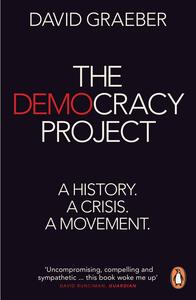Take a photo of a barcode or cover
I’d recommend this book to anyone who’s fascinated by the U.S. system and the political scene there. It’s a pretty brutal critique of not just the U.S., but Western civilization in general, and it gave me a fresh, surprising perspective on anarchism,showing it’s not really about destroying everything or living without rules. The first chapter feels a bit heavy, but once you get into the middle, it’s really good, full of quotable lines and sharp insights.
informative
reflective
medium-paced
informative
inspiring
reflective
medium-paced
The overwhelming bias in the writing was too one sided for my liking.
Compared to his monumental tome, Debt, David Graeber's The Democracy Project brings to light his weaknesses as a writer. For one, he is not one to sit down at a table with allusion nor metaphor.
It is a slow slog through the opening chapter as it's merely exposition: "I did this, then she did that, which made this happen." It is more Occupy Sweet Valley High than engaging reportage. Graeber neither builds a mood, nor hones in on the essential facts. A reader may stay with it, as I did, both out of a respect for the man's intelligence and his engagement to just change as well as the information itself. But it may have been better expressed as a Powerpoint.
To see Graeber live, his eyes that belie his every thought as the speakers around him have their say, is a treat: the man is a non-stop analysis machine. But he can lose his appeal without a strong moderator, there is no internal off-switch.
With The Democracy Project, one doesn't want so much to kick Graeber's butt for its failings, but there's an editor somewhere that needs to be hunted down and held accountable.
For in the final analysis, it is analysis that is Graeber's strong suit. Lurking in the middle of mere exposition is a magnificent essay on Democracy. And small analytical asides sparkle if one is willing to sift the sediment: ideas of vertical vs. horizontal organizations, or definitions of Anarchism and Communism that are concise and challenge received wisdom on those subjects. It truly feels as if that center and central essay had been written and reworked, while the rest had been tacked on afterward. As if the concerns to have a book on Occupy Wall Street over-rode the need for a coherent work. I, myself, would love more books on OWS and Graeber does have first-hand knowledge, but he may be more of a Stewart Brand than a Tom Wolfe. In The Democracy Project, he's ended up with a Frankenbook. Two or three books have been hobbled together and are fighting for the soul of the essay. Had someone the courage to lop off the OWS material and given him another year or two to continue to brew his thoughts, we'd have another classic like Debt on our hands.
Despite its warts, I'd recommend the book for its analysis and ideas. And I eagerly await my next engagement with Graeber.
It is a slow slog through the opening chapter as it's merely exposition: "I did this, then she did that, which made this happen." It is more Occupy Sweet Valley High than engaging reportage. Graeber neither builds a mood, nor hones in on the essential facts. A reader may stay with it, as I did, both out of a respect for the man's intelligence and his engagement to just change as well as the information itself. But it may have been better expressed as a Powerpoint.
To see Graeber live, his eyes that belie his every thought as the speakers around him have their say, is a treat: the man is a non-stop analysis machine. But he can lose his appeal without a strong moderator, there is no internal off-switch.
With The Democracy Project, one doesn't want so much to kick Graeber's butt for its failings, but there's an editor somewhere that needs to be hunted down and held accountable.
For in the final analysis, it is analysis that is Graeber's strong suit. Lurking in the middle of mere exposition is a magnificent essay on Democracy. And small analytical asides sparkle if one is willing to sift the sediment: ideas of vertical vs. horizontal organizations, or definitions of Anarchism and Communism that are concise and challenge received wisdom on those subjects. It truly feels as if that center and central essay had been written and reworked, while the rest had been tacked on afterward. As if the concerns to have a book on Occupy Wall Street over-rode the need for a coherent work. I, myself, would love more books on OWS and Graeber does have first-hand knowledge, but he may be more of a Stewart Brand than a Tom Wolfe. In The Democracy Project, he's ended up with a Frankenbook. Two or three books have been hobbled together and are fighting for the soul of the essay. Had someone the courage to lop off the OWS material and given him another year or two to continue to brew his thoughts, we'd have another classic like Debt on our hands.
Despite its warts, I'd recommend the book for its analysis and ideas. And I eagerly await my next engagement with Graeber.
A fascinating account of Occupy Wall Street from someone who was often incorrectly labeled its leader. David Graeber takes us from the early meetings that would eventually lead to direct actions that would, somewhat unintentionally, begin the Occupy Wall Street movement. He then theorises on why this social anarchist movement became so widespread and popular, whereas so many previous ones failed. His answers there are surprising in that, in many ways, he sort of shrugs, though he does point to several things that made US media and international media ready to broadcast this kind of movement.
He then theorises why it collapsed upon the forced eviction of the people occupying Wall Street. He points primarily to OWS' unwillingness to become a traditional political body that the vaguely left media of america wanted it to be. And even how, when places like MSNBC realized that OWS was not going to be the leftwing version of the Tea Party (a grassroots movement that evolved into a political party with candidates and so on), they almost immediately stopped paying attention to the movement. Of course, he also discusses how popular media smeared OWS and accused them of all kinds of violence and sexual assault, when the evidence shows that OWS actually led to fewer crimes in cities with encampments.
And so the first half of the book is a discussion of OWS specifically. Why it succeeded, how it grew out of previous movements, how it was perceived, and how it was terrorized, and eventually broken down. He also points to some of its longlasting achievements. The book came out before the 2016 election, but it's almost unthinkable that Bernie Sanders would have had the support he did without OWS spearheading many of these discussions and bringing these topics to the forefront of american discourse.
From there, the book become more a discussion of anarchist tactics and strategies, which is equally interesting, assuming you're interested in such things. If you're not, it's probably strange for you to be reading this at all, yes? But Graeber discusses anarchism and democracy, tracing their historical contexts, and how the definition of democracy developed over time, from something undesirable in 1776 to a slogan for anything anti-communist in the 1980s.
But, yes, it's a very interesting book that I'd highly recommend if you've even passing curiosity about anarchism or state tyranny.
He then theorises why it collapsed upon the forced eviction of the people occupying Wall Street. He points primarily to OWS' unwillingness to become a traditional political body that the vaguely left media of america wanted it to be. And even how, when places like MSNBC realized that OWS was not going to be the leftwing version of the Tea Party (a grassroots movement that evolved into a political party with candidates and so on), they almost immediately stopped paying attention to the movement. Of course, he also discusses how popular media smeared OWS and accused them of all kinds of violence and sexual assault, when the evidence shows that OWS actually led to fewer crimes in cities with encampments.
And so the first half of the book is a discussion of OWS specifically. Why it succeeded, how it grew out of previous movements, how it was perceived, and how it was terrorized, and eventually broken down. He also points to some of its longlasting achievements. The book came out before the 2016 election, but it's almost unthinkable that Bernie Sanders would have had the support he did without OWS spearheading many of these discussions and bringing these topics to the forefront of american discourse.
From there, the book become more a discussion of anarchist tactics and strategies, which is equally interesting, assuming you're interested in such things. If you're not, it's probably strange for you to be reading this at all, yes? But Graeber discusses anarchism and democracy, tracing their historical contexts, and how the definition of democracy developed over time, from something undesirable in 1776 to a slogan for anything anti-communist in the 1980s.
But, yes, it's a very interesting book that I'd highly recommend if you've even passing curiosity about anarchism or state tyranny.
I feel terrible about discovering his work after his death. The loss of such an impressive brain at such an early age is pure tragedy.
I love this man lol. His words like drugs to me , changed my life many times and (!) this one (!) fully radicalized my grandma via audiobook on a drive from SC to NY (!) ! Goes from his inside account of OWS to philosophizing democratic methodology to global governance revolution & the power of imagination — in real & knowable terms. Graeber AlwayS deeply empowering and a little emotionally condescending in the same breath hahah. Love him! Xoxo gg
Ps wraps it up w pondering a just was of appointing positions of power & suggests an adapted lottery system. Thank u anarchist gods!
Ps wraps it up w pondering a just was of appointing positions of power & suggests an adapted lottery system. Thank u anarchist gods!
informative
reflective
fast-paced
So optimistic, so empowering, every line is a revelation




